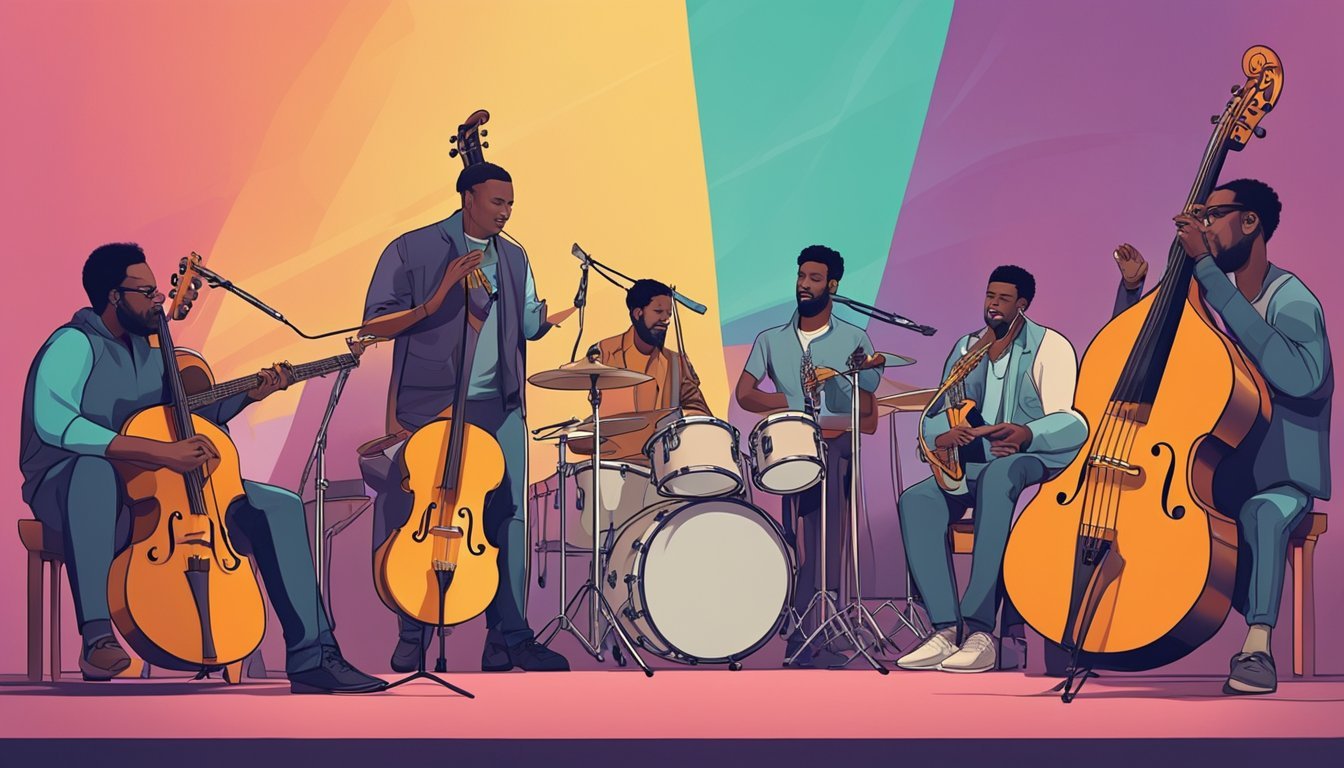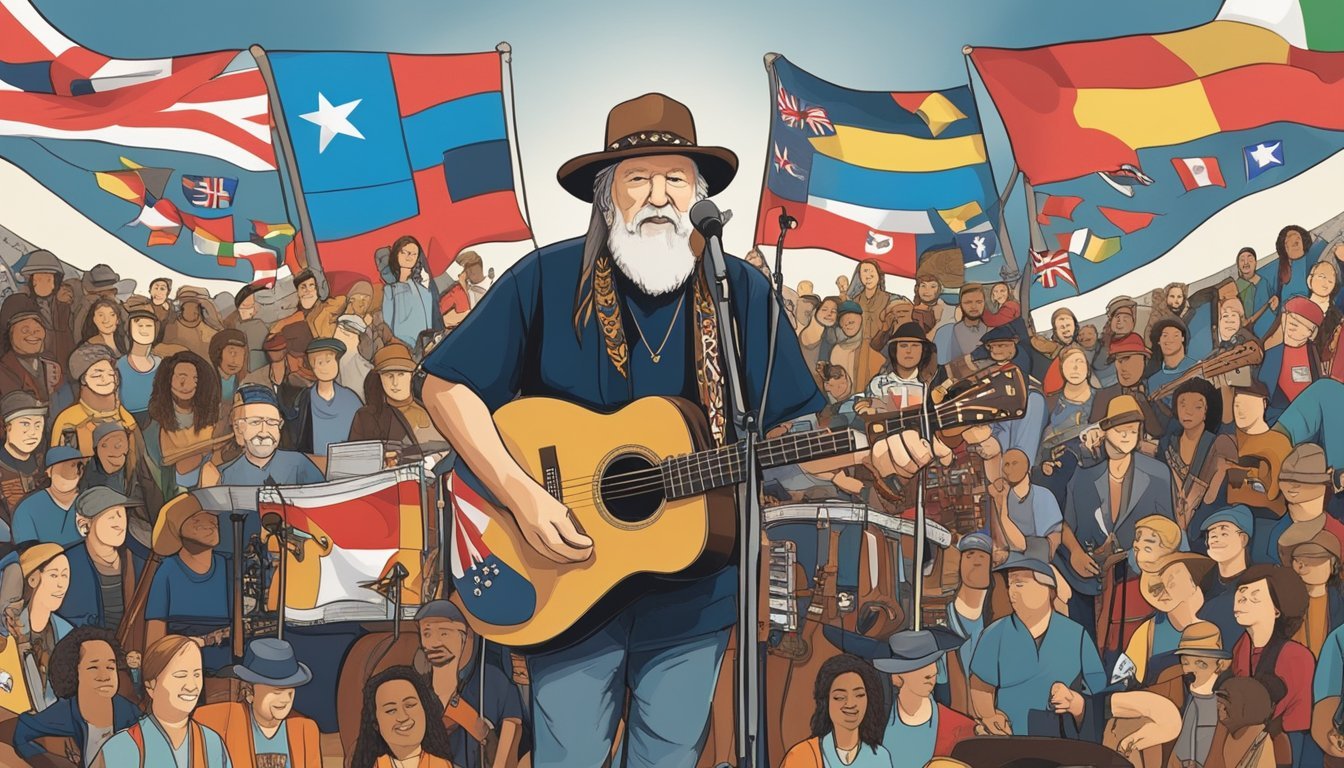Cultural Impact Beyond Country
Willie Nelson's Family Legacy Explored
Willie Nelson's impact on American culture extends far beyond the realm of country music. The recently released docuseries "Willie Nelson & Family" on Paramount+ provides a comprehensive look at the life and legacy of this iconic figure. The series delves into Nelson's journey from humble beginnings to becoming a cultural touchstone.
Willie Nelson's influence spans music, activism, and popular culture, making him a true American icon. His distinctive voice, songwriting prowess, and outlaw persona have resonated with audiences for decades. The docuseries explores Nelson's role in shaping the outlaw country movement and his crossover appeal to fans of various musical genres.
Nelson's impact is not limited to his artistic endeavors. The series highlights his involvement in social and political causes, including his advocacy for family farmers through Farm Aid concerts. It also touches on his personal life, featuring insights from family members and fellow musicians. This intimate portrayal offers viewers a deeper understanding of the man behind the legend and his enduring cultural significance.
Early Life and Rise to Fame
Willie Nelson's journey from small-town Texas to country music icon is a tale of perseverance and artistic evolution. His early experiences and musical shifts shaped the legendary artist we know today.
Abbott, Texas Origins
Born in 1933 in Abbott, Texas, Willie Nelson was raised by his grandparents during the Great Depression. He started writing songs at age seven and performed in local bands as a teenager. Nelson's musical talents blossomed early, playing guitar and singing in church choirs.
His upbringing in Abbott deeply influenced his music and worldview. The small farming community instilled in him a love for rural life and simple pleasures. These themes would later become hallmarks of his songwriting.
The Red Headed Stranger Emerges
Nelson's distinctive voice and songwriting style began to take shape in the 1950s. He worked as a disc jockey and continued to write songs, selling "Family Bible" for $50 in 1957.
His breakthrough came with the concept album "Red Headed Stranger" in 1975. The album's stripped-down sound and narrative structure marked a departure from the polished Nashville productions of the time.
This work solidified Nelson's reputation as an innovative artist and helped establish his iconic image - complete with long hair, bandana, and beat-up guitar.
Nashville to Texas: Shifting Sands in Country Music
Nelson's career took several turns before he found his niche. He moved to Nashville in 1960, initially finding success as a songwriter for other artists.
Despite penning hits like "Crazy" for Patsy Cline, Nelson struggled to gain traction as a performer in Nashville. The city's slick, commercial sound clashed with his raw, authentic style.
Frustrated, Nelson returned to Texas in 1972. This move proved pivotal, as he found a receptive audience for his unconventional approach. He became a key figure in the "Outlaw Country" movement, challenging Nashville's dominance and redefining country music's boundaries.
Musical Evolution and Innovations
Willie Nelson's career spans decades of musical exploration and boundary-pushing. His journey from songwriter to performer marked a significant shift in country music, while his concept albums and collaborations expanded the genre's horizons.
From Songwriter to Performer
Willie Nelson began his career penning hits for other artists. His songwriting prowess earned him recognition in Nashville's music scene. In the early 1960s, Nelson transitioned to performing his own material. This shift allowed him to showcase his distinctive vocal style and guitar playing.
Nelson's fingerpicking technique on his iconic guitar, Trigger, became a signature element of his sound. His vocal phrasing, often behind the beat, added a unique flavor to his performances. These elements helped define the emerging Outlaw Country movement of the 1970s.
Concept Albums and Crossover Success
Nelson's approach to album-making revolutionized country music. His 1974 album "Phases and Stages" told a divorce story from both perspectives. This concept album format was rare in country music at the time.
"Red Headed Stranger" (1975) further cemented Nelson's innovative approach. The album's sparse production and cohesive narrative broke industry norms. It became a commercial and critical success, expanding country music's audience.
"Stardust" (1978) showcased Nelson's crossover appeal. The album of pop standards introduced his interpretations to a wider audience. It spent two years on the Billboard charts, proving Nelson's versatility.
Explorative Collaborations
Nelson's collaborative spirit led to groundbreaking musical partnerships. His work with Waylon Jennings in The Highwaymen supergroup blended different country styles. This collaboration helped redefine the genre's boundaries.
Nelson's duets with artists from various genres expanded his musical reach. Partnerships with Julio Iglesias, Norah Jones, and Snoop Dogg demonstrated his adaptability. These collaborations introduced Nelson's music to new audiences and generations.
His willingness to experiment extended to benefit concerts and compilations. Farm Aid, which Nelson co-founded, became an annual event showcasing diverse musical talents. These collaborations reinforced Nelson's role as a unifying figure in American music.
Cinematic Journey
Willie Nelson's life and legacy have become the subject of compelling documentaries and films. These works offer intimate glimpses into the artist's personal and professional journey, capturing his musical genius and cultural impact.
Documentary Contributions
Willie Nelson has been featured in several documentaries over the years. These films showcase his musical talent, activism, and personal life. Archival footage plays a crucial role in these documentaries, providing viewers with a visual history of Nelson's career.
Many documentaries explore Nelson's influence on country music and popular culture. They often include interviews with fellow musicians, friends, and family members, offering diverse perspectives on his life and work.
Willie Nelson & Family
"Willie Nelson & Family" is a four-part docuseries released on Paramount+. Directed by Thom Zimny and Oren Moverman, this series offers an in-depth look at Nelson's life and career.
The docuseries premiered at the Sundance Film Festival, garnering critical acclaim. It features extensive interviews with Nelson, his family members, and collaborators. The series delves into Nelson's musical journey, personal struggles, and enduring legacy.
Zimny and Moverman's approach focuses on presenting an authentic portrayal of Nelson's life, balancing both triumphs and challenges.
The Emotional Narrative in Film
Films about Willie Nelson often aim to capture the emotional truth of his experiences. Directors strive to convey the passion behind his music and the depth of his personal relationships.
These cinematic works frequently explore themes of resilience, creativity, and family bonds. They highlight Nelson's ability to connect with audiences through his music and authenticity.
Filmmakers use various techniques to evoke emotional responses from viewers. These may include intimate performance footage, candid interviews, and carefully curated archival material.
Impact and Influence
Willie Nelson's influence extends far beyond the realm of country music. His unique style and approach have shaped the industry and touched the lives of millions of fans and fellow artists alike.
The Outlaw Music Movement
Willie Nelson played a pivotal role in the Outlaw Music Movement of the 1970s. This movement challenged the polished Nashville sound, embracing a rawer, more authentic approach to country music. Nelson's unconventional style and refusal to conform to industry norms inspired other artists to forge their own paths. His album "Red Headed Stranger" became a cornerstone of the movement, proving that artistic integrity could coexist with commercial success.
Inspiring Generations
Nelson's influence spans generations of musicians across various genres. His songwriting prowess, distinctive voice, and guitar playing have inspired countless artists. Young country stars often cite Nelson as a major influence, while rock and pop musicians frequently collaborate with him. The Outlaw Music Festival, featuring Nelson alongside diverse acts like Bob Dylan and John Mellencamp, showcases his broad appeal and continued relevance in the music world.
Legacy and the Emotional Connection
Willie Nelson's legacy extends beyond his musical contributions. He has become a cultural icon and a national treasure. His advocacy for farmers, environmental causes, and marijuana legalization has endeared him to many. Nelson's music creates a deep emotional connection with listeners, addressing universal themes of love, loss, and perseverance. His longevity in the industry, coupled with his authenticity and relatability, has cemented his status as a beloved figure in American culture.
Personal Struggles and Triumphs
Willie Nelson's life has been marked by significant challenges and remarkable resilience. His journey illustrates the power of perseverance and the ability to find purpose through adversity.
Confronting Adversity
Willie Nelson faced severe financial troubles in the 1990s. The IRS hit him with a $32 million tax bill, forcing him to sell many assets. This crisis stemmed from years of mismanaged finances and poor investments.
Nelson also grappled with personal losses. His son Billy died by suicide in 1991, a devastating blow to the family. This tragedy deeply affected Nelson's outlook on life and his music.
Marriage difficulties added to his struggles. Nelson went through multiple divorces, which took an emotional and financial toll.
Resilience and Redemption
Despite these setbacks, Nelson displayed remarkable resilience. He negotiated with the IRS and released the album "The IRS Tapes: Who'll Buy My Memories?" to help pay off his debt.
Nelson's music became a healing force. He channeled his grief into songwriting, producing some of his most poignant work during this period.
His perseverance paid off. Nelson cleared his debts by 1993 and rebuilt his career. He emerged from these trials with renewed focus and determination.
Life Beyond Music
Nelson's struggles inspired him to help others. He became an advocate for various causes, including environmental issues and farm aid.
He explored new ventures, including biodiesel production and marijuana entrepreneurship. These diverse interests showcased his adaptability and willingness to evolve.
Nelson's personal growth extended to his relationships. He found stability in his fourth marriage to Annie D'Angelo, which has lasted since 1991.
His ability to overcome failure and realize new dreams in his later years has made Nelson an inspiring figure to many.
Collaborations and Friendships
Willie Nelson's career is marked by numerous musical partnerships and deep personal connections that have shaped his artistry and legacy. These relationships have spanned decades and genres, solidifying his place as a unifying force in American music.
Iconic Musical Partnerships
Willie Nelson has collaborated with a diverse array of artists throughout his career. His duets with Dolly Parton, including their rendition of "Everything's Beautiful (In Its Own Way)," showcased the harmony between two country legends. Nelson's work with Kenny Chesney on "Lucky Old Sun" bridged generations of country music.
Collaborations extended beyond country, as evidenced by his Grammy-winning album with jazz artist Norah Jones, "Here We Go Again: Celebrating the Genius of Ray Charles." Nelson's willingness to cross musical boundaries led to partnerships with artists like Snoop Dogg and Cyndi Lauper, demonstrating his versatility and appeal across genres.
Twin Soul: Bobbie Nelson
Bobbie Nelson, Willie's older sister, was a cornerstone of his musical journey. She joined Willie's band in 1973 as the pianist, becoming known as "Sister Bobbie." Their musical connection was profound, with Bobbie's piano work complementing Willie's distinctive guitar style and vocals.
The siblings recorded several albums together, including "December Day: Willie's Stash, Vol. 1." Their lifelong collaboration was a testament to their shared musical roots and family bond. Bobbie's presence in Willie's band was a constant until her passing in 2022, marking the end of one of country music's longest-running musical partnerships.
Country Music Family
Willie Nelson's influence extends to a wider circle of country music artists he considers family. His friendship with Patsy Cline in the early 1960s was pivotal; he wrote her hit "Crazy," which became one of the most played jukebox songs of all time.
Nelson's camaraderie with fellow outlaw country artists like Waylon Jennings and Kris Kristofferson led to the formation of The Highwaymen supergroup. He's also mentored younger artists, collaborating with Shelby Lynne and supporting emerging talent. Nelson's annual Farm Aid concert, which he co-founded, brings together artists for a cause, reinforcing the sense of community he's fostered in the music industry.
Contributions to Society
Willie Nelson's impact extends far beyond his musical accomplishments. His philanthropic efforts and community engagement have left an indelible mark on American society.
Farm Aid and Advocacy
Willie Nelson co-founded Farm Aid in 1985, an annual benefit concert supporting family farmers. The organization has raised over $60 million to promote a strong and resilient family farm system of agriculture. Nelson's advocacy has brought national attention to the challenges faced by small-scale farmers.
Farm Aid provides resources and grants to farm families in crisis. It also funds programs that help farmers thrive through sustainable farming practices. Nelson's commitment to this cause has inspired other artists to join the fight for America's farming communities.
Luck Ranch: The Haven of Harmony
Nelson's Luck Ranch in Spicewood, Texas, serves as more than just a home. It's a sanctuary for rescued horses and a gathering place for musicians and fans. The ranch hosts the annual Luck Reunion, a music festival that showcases both established and emerging artists.
This 700-acre property embodies Nelson's values of community and music appreciation. It provides a unique space where artists can collaborate and fans can experience intimate performances. Luck Ranch has become a symbol of Nelson's dedication to preserving music history and fostering creativity.
The Unbreakable Bond with Fans
Willie Nelson's connection with his fans goes beyond typical artist-audience relationships. His accessibility and down-to-earth nature have cultivated a loyal following spanning generations. Nelson often stays after shows to sign autographs and chat with fans.
His annual 4th of July Picnic, a tradition since 1973, brings together fans and fellow musicians for a day of music and celebration. This event exemplifies Nelson's ability to create a sense of community through his music.
Nelson's resilience in the face of personal and professional challenges has inspired many. His openness about his struggles has helped destigmatize issues like marijuana use and debt, fostering a culture of understanding among his fans.
Reflections on Willie Nelson's Legacy
Willie Nelson's influence extends far beyond country music, shaping American culture for over seven decades. His unique style and outlaw persona have left an indelible mark on music and society.
Assessing the Cultural Impact
Willie Nelson's impact reaches into film, literature, and social movements. His advocacy for farm aid and marijuana legalization transformed him into a countercultural icon. Nelson's music bridged generational and genre gaps, collaborating with artists from jazz to rock.
Texas Monthly has chronicled Nelson's journey extensively, portraying him as a state treasure. His Fourth of July Picnic became a Texan institution, celebrating music and independence annually. Nelson's braids and bandana became as recognizable as his music, cementing his status as a cultural touchstone.
The Singing Cowboy's Everlasting Influence
Known as the "Singing Cowboy," Nelson redefined the archetype with his rebellious spirit. His album "Shotgun Willie" marked a turning point, blending country with rock and folk influences. This fusion expanded country music's appeal and paved the way for future genre-bending artists.
Nelson's songwriting prowess earned him acclaim across the music industry. Classics like "Crazy" and "On the Road Again" transcended country, becoming part of the American songbook. His longevity in the spotlight, still touring at 90, inspires new generations of musicians.
Nelson's legacy as a Country Music Icon is secure, with his influence felt in Nashville and beyond. His authentic approach to music and life continues to resonate with fans worldwide.









